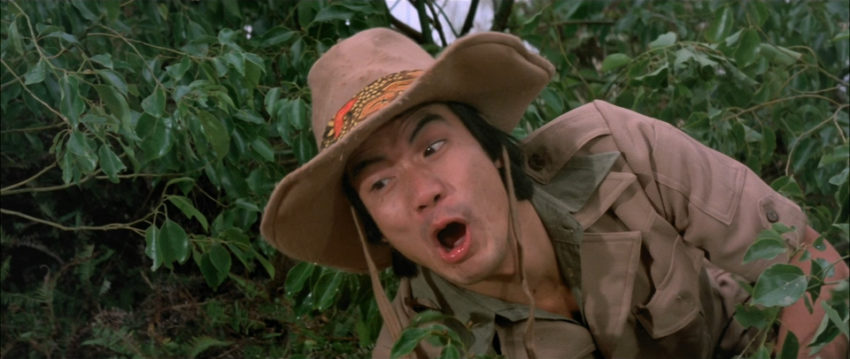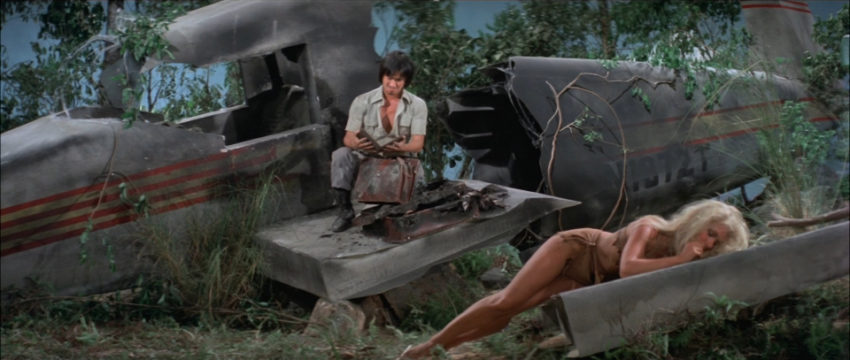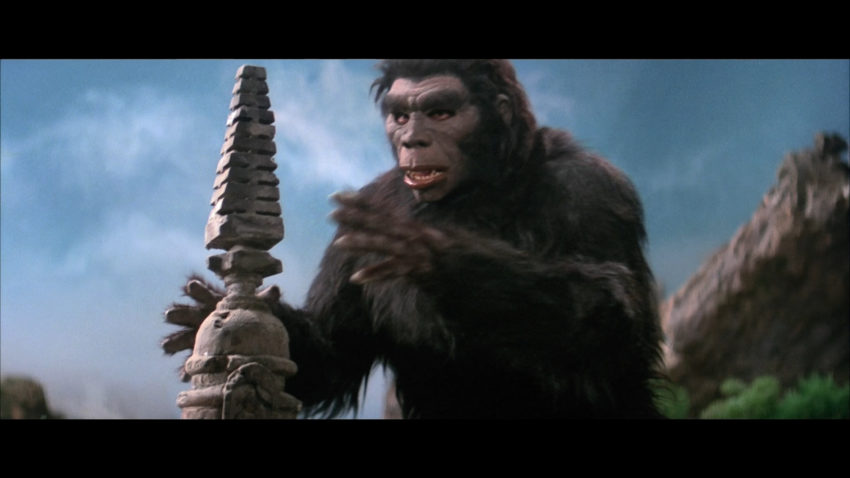Mighty Peking Man
February 12, 2022 · 0 comments
By Shelley Pallis.

Rushed into production in the wake of the 1976 US King Kong remake (and originally intended as a King Kong movie, before the rights proved less in the public domain than the film-makers expected), Mighty Peking Man’s original title in Chinese translates as the much simpler Ape King. And to be fair, pretty much everything about this film is similarly on-the-nose, playing like a pantomime retelling of familiar Hollywood adventure movies. Shaw Brothers films in the 1960s and 1970s were increasingly concerned with appealing to audiences in far-flung corners of the Chinese diaspora, and needed to make sense to an implied viewer that might not be able to understand either the soundtrack or the subtitles. One imagines a test of fitness for purpose that involved not a gang of chin-stroking critics in a movie theatre, but a Malaysian docker trying to see a TV screen across a noisy, smoke-filled bar where seven sailors were busy beating the shit out of each other around a pool table. There is remarkably little dialogue, and huge chunks of the film pass as musical interludes or noisy action sequences, making it a sleek, super-efficient example of the kind of movie that brought Shaw Brothers regional success in the period.
With customary Shaw Brothers abruptness, the story wastes no time in propelling the cast from a hastily-convened meeting in a library to the wilds of the Indian hinterland, on a quest in search of a giant gorilla. Flashbacks pop up periodically to fill in backstory – there have been reports of a gorilla attack on a remote village, and leading man Johnny/Zhengfeng (Danny Lee) is miserable because he caught his girlfriend in bed with his little brother.

There is a certain irritating swagger to the Chinese cast, something they appear to have adopted wholesale from an overdose of H. Rider Haggard and Rudyard Kipling, shooting, sneering and littering their way across the mountains. The Chinese cast members blissfully adopt the role of Great White Hunters, ambling along jungle pathways with their guns and hats, followed by a coterie of disposable Indian porters. Once most of them have been eaten, drowned or fallen from a cliff, the supporting cast comprises a bunch of Hong Kong extras in unconvincing blackface.
Just when things couldn’t get any more ludicrous, the story introduces Samantha/Ah-Wei (the late Evelyne Kraft), a blonde waif in a chamois-leather bikini, swinging between the creepers of the Himalayan foothills. At her first appearance, even Johnny can’t believe his eyes, and waves the party along without a backward glance, but she is soon back to form the movie’s scream-queen core.
Abandoned by his feckless travelling companions, Johnny encounters the giant gorilla alone, and is saved by Samantha, whose commands the creature obeys. She has been raised by the gorilla in the jungle, Tarzan-style, as the sole survivor of the plane crash that killed her parents. In the process, she has learned how to communicate with most of the jungle creatures, and also somehow picked up a smattering of Chinese, so full marks to the jungle education system. I’m not 100% sure that all the creatures in this jungle are actually native to India, but it didn’t seem to bother the film-makers, and I’m certainly not going to start splitting taxonomic hairs regarding a film about a giant gorilla, which already defies the rules of narrative, physics and biology.

Samantha’s arrival highlights much of the unobtrusive special effects work by Koichi Kawakita, who would return to Japan to become the SFX director on films including Sayonara Jupiter and Gunhed in the 1980s. One becomes inured to blue-screen overlays of monsters stamping on buildings, but Kraft is integrated with her surroundings in a cunning series of effects shots, model work, realistic dummies and what appear to be extremely well-trained or heavily-doped animals. She tickles tigers and cuddles cheetahs, but remains vulnerable to a poisonous snake, resulting in a salacious scene in which the lucky Johnny has to suck poison out of a snake-bite on her shapely inner thigh.
While Johnny’s heartless rival Lu Tian (Ku Feng) cavorts in a hotel swimming pool with a bevvy of Indian beauties, telling the media that Johnny is sure to be dead in the jungle, Johnny nurses Samantha back to health in a remote cave – it’s only later in the film that Johnny reveals his time in the jungle spanned a whole year of unseen character development and romance. Samantha is not quite recovered from her poison-induced delirium before she is locking lips with Johnny, and the two spend a happy time skipping around the forest (it’s not a jungle any more). I spent much of the film wondering when one of her nipples was going to slip out of her skimpy leather bra, as indeed one does shortly before the midpoint of the feature. So that’s something to look out for.
Which brings me to the gorilla itself, “Ah-Wang” by name (“the King”), played by Japanese monster-modeller Keizo Murase, formely of Wrath of Daimajin and Mothra and Matango, here inside a gorilla suit of his own making. Having saved Samantha from certain death and raised her as his own, he develops a certain Freudian jealousy of the latecoming Johnny. Johnny, for his part, has no qualms about drafting Samantha into helping him bring Ah-Wang to Hong Kong, even though he is essentially grooming her to agree to a situation she cannot possibly comprehend.

Despite being chained up on deck, Ah-Wang saves his captors’ ship when it is blown onto rocks during a storm. Back in Hong Kong, all is forgiven with Johnny’s younger brother, a journalist with the Shaw Brothers-owned TVB network, leading to some meta moments in which a Shaw Brothers film is filmed on location at a Shaw Brothers company, where a Shaw Brothers starlet is filmed singing one of the theme songs from the film itself, on a TVB soundstage. Johnny’s faithless Chinese old flame admits that her behaviour was unforgiveable, but still expects forgiveness and a second chance, which will require that blonde girl from the jungle to be conveniently edged out of the picture.
Ah-Wang remains chained and tormented at his Hong Kong stadium appearance, bafflingly billed on posters in the film as “Mighty Peking Man” – hence the use of the title in English for the movie itself, even though “Peking Man” is actually an archaeological term referring to a prehistoric hominid, and nothing to do with giant apes. Nobody bats an eyelash at the sight of a weeping blonde cavewoman wandering the streets of Hong Kong, and Samantha suddenly develops enough of a grasp of Chinese to badger a passing couple into giving her a lift. They’re white, so presumably there is some sort of secret gweilo handshake to achieve all this.

At the stadium, Lu Tian tries to rape Samantha,in a scene in which he pours brandy over her and rips off her bra. Ah-Wang sees the incident through a window and finally slips his chains, going on the rampage while Lu Tian flees in his Porsche (stopping for a moment to take off his watch… is that a thing?). His path of destruction through Hong Kong is not merely a snapshot of monster-movie effects in the mid-1970s, but of local society. The film-makers cannot have given it much thought at the time, but the movie’s grand climax, as watched in 2021, is a glorious time capsule of culture and costumes – the middle-class family disturbed at dinner; the businessmen evacuating a dorm of bunk beds; the green-uniformed Royal Hong Kong Police; the mah-jong player who briefly sneaks back to snatch his winnings.
In the finale, he scales what was then the tallest building in Hong Kong – the Connaught Centre, now known as Jardine House, or in local reference to its distinctive round portal-windows, the “House of a Thousand Arseholes.”
More than forty years after its premiere, viewed through contemporary eyes, Mighty Peking Man is even more of a tragedy than the King Kong that inspired it. Samantha is lured to her doom as surely as if she had been caught in the path of stampeding elephants, while Johnny’s treatment of her, while entirely commonplace by the standards of 1970s movie heroism in Hong Kong and elsewhere, seems callous and gaslighty to my wannabe-woke modern eyes. Meanwhile, he is oddly forgiving of Lu Tian, who left him for dead in the Indian jungle, but apparently that doesn’t matter if there’s a giant monkey to bring back to Hong Kong. Samantha is treated as a feral, disposable creature of cheesecake, joyously half-naked, enthusiastically sexual, entirely in keeping with attitudes of the time, but somewhat galling in 2021. Meanwhile, the Cantonese cast and crew depict the British masters of Hong Kong as clueless, lying careerists, unwilling to keep their earnest promises, and wrecking their colony even as they try to save it. Ah yes, the bad old days…
Mighty Peking Man is one of the discs in the massive Shaw Brothers Blu-ray box set, available from Arrow Video.
Leave a Reply